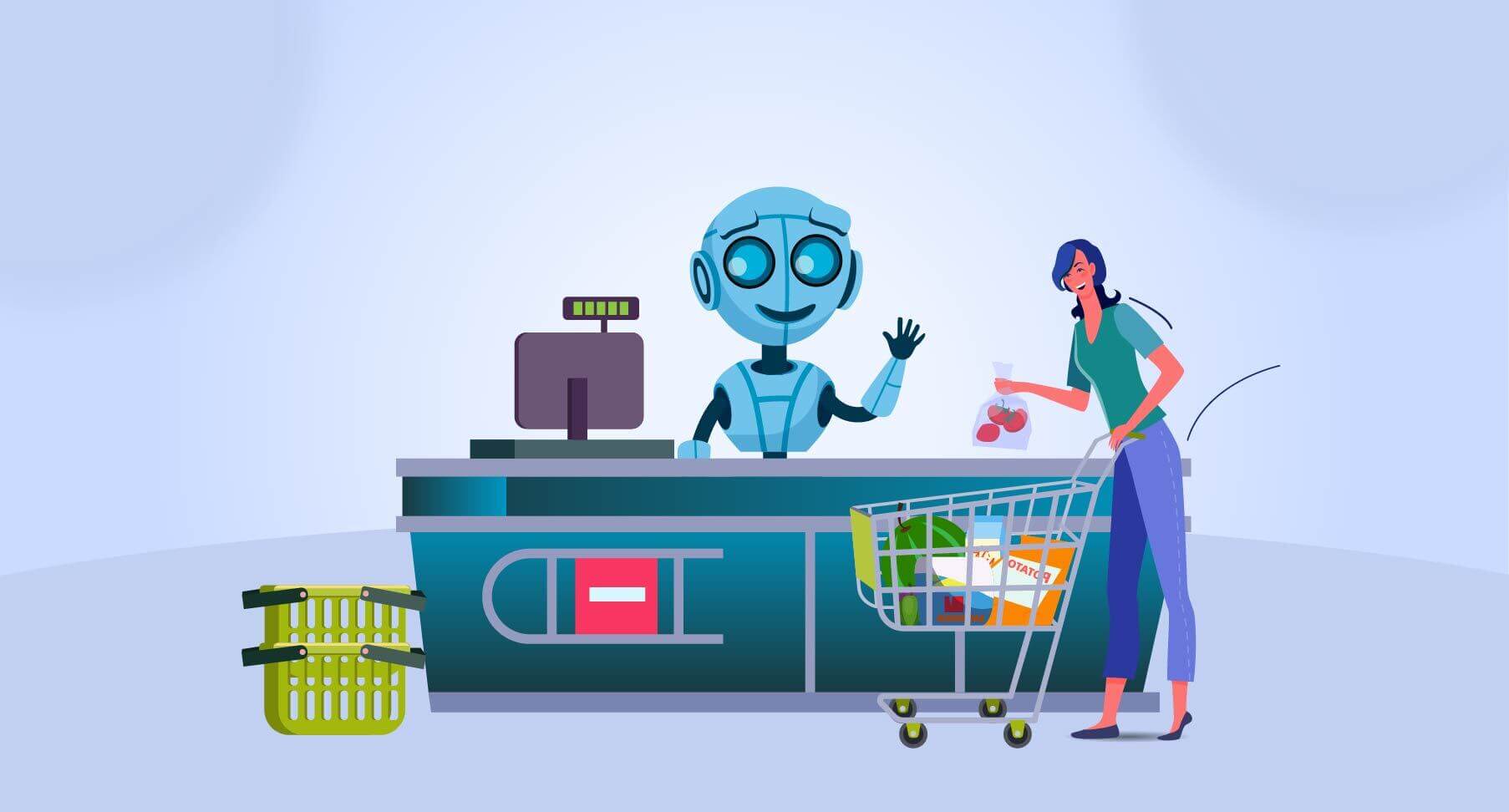Artificial intelligence helps humanity in many ways, and one such way is the application of ai in cybersecurity, cybercrime prevention and recovery.
A poll run by Capgemini Research Institute revealed that 69% of businesses feel AI plays an active role in combate against various types of cybercrimes.
Technology advancement has provided a new space for hackers who seek to steal data and disrupt organizations. Each year, the number of cybercrime has been increasing, reaching billions in damages globally.
Thanks to artificial intelligence, we now detect fraud and analyze huge amounts of data without much effort. How? Keep on reading to find out more about artificial intelligence in cybersecurity.
What is Artificial Intelligence?
In simple words, artificial intelligence can be defined as the process of replicating human intelligence in a machine and programming it so that it thinks like humans and mimics our actions.
Its development goes back to the 1940s when humans started testing computer abilities and saw that machines could automatically complete complex tasks.
Here are the most important facts regarding AI:
- It is used in various fields, for example, in healthcare cybersecurity.
- Some argue that advanced AI solutions will have a negative impact on society.
- AI mimics learning, reasoning, and perception.
- There are two types; strong and weak artificial intelligence.
Artificial intelligence is built to take action to reach a specific goal. The technology is linked to machine learning (ML), which is a concept that describes computers and machines working on their own, or in other words, without the assistance of humans.
How Does AI Work?
Artificial intelligence (AI) uses machines to mimic the nature of the human mind. For this reason, it trains itself to collect data and build unique models that help make accurate decisions. If we look closer, AI algorithms assist us in our daily lives, starting with smart assistants like Siri and ending in self-driven cars and smart helmet. Unlike humans, typically, AI isn’t prone to error.
AI works by imitating cognitive processes. Cognition is based on mental actions or processes that require knowledge of senses, experiences, and thoughts.
For example, researchers inspect mental processes to check how the information is stored and then use it to guide human behavior. That knowledge today helps developers take a huge step towards designing effective AI marketing tools and machines.
Three Types of AI
AI technologies can be categorized according to their capacity to mimic human characteristics. And although there are many different types of AI, it all comes down to three major types.
Three types of AI and its working principles:
- Assisted Intelligence. This is the most basic level of artificial intelligence. To put it simply, it improves businesses that are already utilizing AI today. As mentioned earlier, this type of AI helps automate standard processes by combining data science, cloud, and the power of Big Data to enhance its decision-making abilities.
- Augmented Intelligence. The second level of AI is mentioned when discussing the overall abilities of artificial intelligence. You can say that it’s still emerging, helping companies to succeed with things they couldn’t previously do. Combined with machine learning, augmented intelligence layers its systems to mimic human capabilities.
- Autonomous Intelligence. Once science fiction, now it’s a reality. This is the most advanced form of AI today, which enables bots, apps, systems, and machines to act independently. For example, self-driven cars are an illustration of autonomous intelligence.
That said, artificial intelligence can mimic learning, reasoning, and perception. Despite such a technological milestone, skeptics argue that no machine can outperform humans when it comes to problem-solving or decision-making.
However, despite the negative opinions, AI innovators are determined to enable artificial intelligence to the point that it would outsmart humans and their capabilities to learn.
AI Use Cases in Cybersecurity
Our beloved Gmail has used AI and machine learning methods to categorize emails since its start almost two decades ago. Of course, there are ML algorithms in nearly all of Gmail’s services nowadays.
Another great example of the early use case of AI in cybersecurity is by IBM. The company used its Watson cognitive learning platform to gather data and detect threats through machine learning.
AI Decision Making: A way to use AI to combat cybercrime
Many tech-driven businesses are now investing in AI-powered tools to automate processes and make better, more efficient decisions. However, humans can’t compete with AI in handling data. Artificial intelligence is capable of analyzing and categorizing complex structures in real-time. That’s why some workers are even replaced by machines, helping companies save funds.
AI quantifies data to make more accurate decisions and predictions. According to recent findings by McKinsey, approximately 70% of businesses will use at least some sort of AI-based technology by 2030.
It is now more than important for companies to include AI solutions into their agenda if they want to grow quicker by increasing revenue and profits. In addition, artificial intelligence is convenient for businesses because of its ability to learn and teach itself. For AI, the more decisions, the higher the chance of learning something new.
For instance, AI in cybersecurity is used to detect fraudulent patterns and prevent suspicious activity from spreading further. Another great example of AI and its benefits is the e-commerce sector.
AI helps make great market decisions and recommendations in real-time. At the same time, learning from gathered transaction data helps understand user behavior easier and allows to make adjustments to improve future sales.
Artificial Intelligence and Cybercrime
How does artificial intelligence help detect fraud and cybercrime? We’ve already discussed that machines help us to analyze data quicker and minimize human error, which makes them perfect for enhancing any fraud detection tool.
Today’s businesses face many challenges. But, some of the most common cybercrime-related challenges that businesses face today are:
- A major surface for cyberattacks;
- Hundreds of devices per single business;
- The widespread use of technology;
- Huge amounts of data;
- Lack of skilled cybersecurity specialists.
Artificial intelligence helps overcome these challenges. Rather than waiting for potential cyberattacks, AI-based systems enable proactive protection against bad actors.
It’s extremely important, especially in the financial sector, like financial modernization, where having a strong cybersecurity policy and a proper fraud prevention system helps avoid devastating consequences that bad actors bring to the table.
A recent Fintech News report states that 64% of the surveyed financial institutions say that artificial intelligence could detect a fraudulent attack before it happens.
AI software can estimate how or when you will likely be hacked. Having such data allows you to prepare and strategize your moves to prevent yourself from different types of cyber attacks and strengthen your protection from dangerous online criminals.
Applications of AI in Cybersecurity
Below is the list of ways to use AI in cybersecurity to make a positive impact:
Identity Verification
The AI-powered digital authentication method of verifying the identity of your customers is one of the emerging trends in identity verification for obvious reasons. Nobody wants cybercriminals accessing their site, let alone getting their hands on important data.
So to prevent fake identities and fraudulent transactions from spreading in e-commerce and various online platforms, companies verify their customers by asking them to upload a document of their ID and a selfie during the onboarding process.
Risk Prediction
AI-powered software uses previous fraudulent patterns and suspicious user activity to make effective assumptions about possible security threats, such as potential data breach cases. By utilizing AI in cybercrime, businesses can implement enhanced configurations and updated procedures to improve the company’s general cybersecurity program.
Fraud Scoring
Artificial intelligence can help inspect the risk of any transaction by developing a unique fraud score. AI determines if the transaction is fraudulent by taking certain measures from the data gathered from time, user’s card frequency, IP address, and transaction history or amount.
In this case, the software flags such a transaction as suspicious, typically asking the customer to go through additional checks to ensure no crime occurs. In general, machine learning helps improve the accuracy of the fraud scores that improve over time.
Clear Controls
Having a security system isn’t enough. AI tools can help balance out the security gaps and prevent unplanned scenarios in real-time. That’s why powering artificial intelligence ensures that your security tools maintain a proper security posture.
Business Verification
Similar to authenticating customers, companies use unique AI tools to scan and review any organization, including its customers, social media profiles, webpage, or financial reports. Previously, companies used manual data reviewing procedures.
However, reviewing the whole background of the company and its staff can take weeks. Thanks to AI, you can review and find out more about your business partners in minutes. Do you want to prevent partnering with a shady company or becoming a money laundering channel? Try out a fully automated Verify My Business software to find out more.
In-Depth Analysis
Managing complex information is much easier with the help of artificial intelligence. If something’s clear and understandable to the cybersecurity team, that doesn’t mean it will make sense to other teams in the organization.
AI helps report issues by providing in-depth research data and recommendations, backing up decisions across the whole company, including the CEO, auditors, or end users.
Efficient Response
Artificial intelligence immediately responds to security threats. If there’s a cybersecurity incident in the organization, AI alerts the specialist; this way helps avoid further problems.
Wrapping Up
It’s not arguable that artificial intelligence is a powerful tool in cybersecurity. The more we use technology, the more opportunities it creates for cybercriminals. That’s why users and businesses must be prepared to face the ever-evolving landscape of sophisticated digital threats.
While cybercriminals go the extra mile to train artificial intelligence as a tool to breach essential security systems, we need to search for innovative, AI-powered solutions that would protect our data.















Leave a Reply